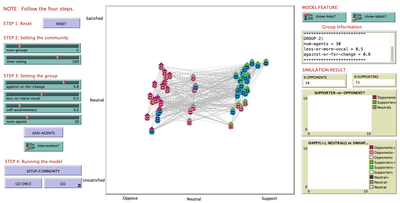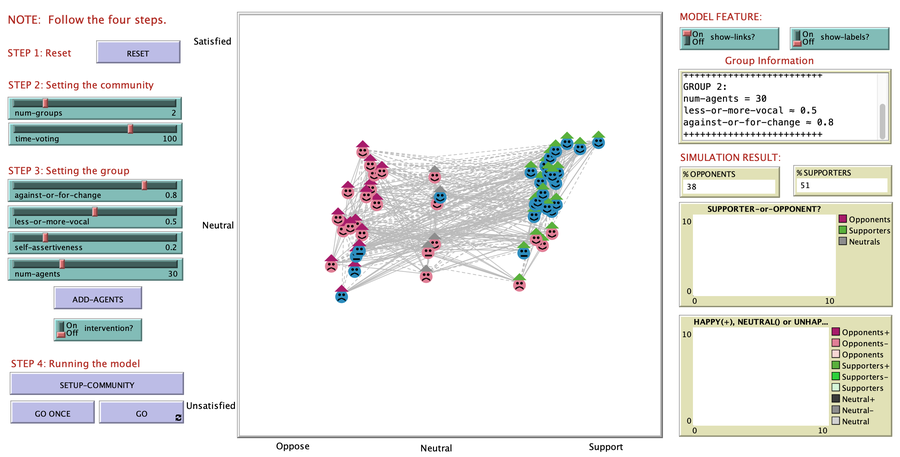Gaming Polarisation: Using Agent-Based Simulations as A Dialogue Tool (1.0.0)
This model aims to replicate the evolution of opinions and behaviours on a communal plan over time. It also aims to foster community dialogue on simulation outcomes, promoting inclusivity and engagement. Individuals (referred to as agents), grouped based on Sinus Milieus (Groh-Samberg et al., 2023), face a binary choice: support or oppose the plan. Motivated by experiential, social, and value needs (Antosz et al., 2019), their decision is influenced by how well the plan aligns with these fundamental needs.

Release Notes
This model is designed to replicate the dynamics governing the Evolution of Opinions and Behaviors on a Plan (EOBoP) among individuals, referred to as agents, within a community over time. Its primary goal is to investigate the evolution of opinions and behaviours and, secondarily, to foster dialogues among community members about the simulation outcomes, thereby promoting civic inclusivity and enhancing engagement.
Associated Publications
Wang S.; Jager W. (2025) Gaming Polarisation: Using Agent-Based Simulations as A Dialogue Tool. (Accepted) Sustainability.
Gaming Polarisation: Using Agent-Based Simulations as A Dialogue Tool 1.0.0
Submitted by
Shaoni Wang
Published May 09, 2025
Last modified May 09, 2025
This model aims to replicate the evolution of opinions and behaviours on a communal plan over time. It also aims to foster community dialogue on simulation outcomes, promoting inclusivity and engagement. Individuals (referred to as agents), grouped based on Sinus Milieus (Groh-Samberg et al., 2023), face a binary choice: support or oppose the plan. Motivated by experiential, social, and value needs (Antosz et al., 2019), their decision is influenced by how well the plan aligns with these fundamental needs.
Release Notes
This model is designed to replicate the dynamics governing the Evolution of Opinions and Behaviors on a Plan (EOBoP) among individuals, referred to as agents, within a community over time. Its primary goal is to investigate the evolution of opinions and behaviours and, secondarily, to foster dialogues among community members about the simulation outcomes, thereby promoting civic inclusivity and enhancing engagement.

